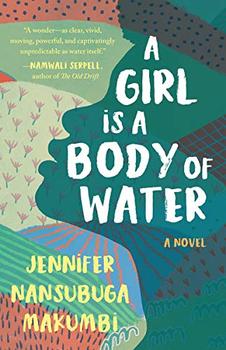Summary | Excerpt | Reviews | Beyond the Book | Read-Alikes | Genres & Themes | Author Bio

This article relates to A Girl is A Body of Water
 In A Girl Is a Body of Water, set in the 1970s-'80s, Jennifer Nansubuga Makumbi presents a compelling protagonist named Kirabo who is coming of age in Uganda and learning what it means to be a woman from her grandmother, aunts and other women in her village. Like most cultures, Ugandan society is largely patriarchal in structure. Women are generally expected to care for the household and children, despite the fact that many also perform paid labor outside of the home. A 2018 report by OXFAM indicates that it is viewed as socially unacceptable for men to engage in household duties because these are traditionally "a woman's task." The same study notes that 62 percent of women surveyed reported their husbands having paid a "bride price"— a dowry given by a man to the family of the woman he wants to marry — and that women whose husbands paid this fee are often expected to take on more work in the home. Polygamy is legal in Uganda, though it is controversial; a petition introduced by women's rights group MIFUMI in 2018 to have the practice ruled unconstitutional was dismissed by a judiciary panel. MIFUMI has also been active in the fight against domestic violence in Uganda and successfully lobbied for bride price law reforms.
In A Girl Is a Body of Water, set in the 1970s-'80s, Jennifer Nansubuga Makumbi presents a compelling protagonist named Kirabo who is coming of age in Uganda and learning what it means to be a woman from her grandmother, aunts and other women in her village. Like most cultures, Ugandan society is largely patriarchal in structure. Women are generally expected to care for the household and children, despite the fact that many also perform paid labor outside of the home. A 2018 report by OXFAM indicates that it is viewed as socially unacceptable for men to engage in household duties because these are traditionally "a woman's task." The same study notes that 62 percent of women surveyed reported their husbands having paid a "bride price"— a dowry given by a man to the family of the woman he wants to marry — and that women whose husbands paid this fee are often expected to take on more work in the home. Polygamy is legal in Uganda, though it is controversial; a petition introduced by women's rights group MIFUMI in 2018 to have the practice ruled unconstitutional was dismissed by a judiciary panel. MIFUMI has also been active in the fight against domestic violence in Uganda and successfully lobbied for bride price law reforms.
About 80 percent of Ugandan women take part in paid work outside the home, according to statistics from the United Nations. There is, however, a substantial wage gap of anywhere from 10-40 percent between men and women. The United Nations Development Programme has organized a campaign providing grants, equipment and livestock to women in Uganda to promote gender equity and independence. Working outside the home provides women with financial stability and empowerment A senior level officer of Uganda's Ministry of Gender, Labour and Social Development told Global Press Journal, "When these women are able to earn their own money, they become stronger."
This strength and independence can be critical for women who need to escape from a dangerous situation. In a national demographic survey from 2011, 56 percent of women and girls (ages 15-49) in Uganda reported having been victims of domestic violence, and 28 percent reported being victims of sexual violence. Legal efforts to pass meaningful legislation to combat this issue have repeatedly stalled, and the legislation in place is often ineffective. Critics of the Domestic Violence Act of 2010 argue that the law lacks critical protections, failing to criminalize marital rape, for example. A report from the International Federation for Human Rights notes that women are often further hindered in seeking justice because of limited access to medical and legal resources.
Education is also an important factor in developing independent and successful women. The UN reports that about half of girls and young women in Uganda ages 15-24 are illiterate and that four out of five girls do not attend high school. This is the result of a confluence of challenges, including poverty, sexist cultural attitudes and an extremely high teen pregnancy rate — nearly 25 percent of girls ages 15-19 have been or are pregnant according to 2019 research data.
Nevertheless, Uganda continues to make strides toward gender equality. The Ugandan parliament is made up of 34.7 percent women (as of 2019). In addition to MIFUMI, numerous organizations are working hard to empower women and reduce gender discrimination. The Uganda Women's Network advocates for legislative action to improve economic circumstances for Ugandan women, while Uganda For Her promotes education and access to medical care and menstrual supplies (click to donate), as well as running a workshop teaching leadership skills to girls.
by Lisa Butts
Ugandan women working with machinery, courtesy of UNDP
Filed under People, Eras & Events
![]() This "beyond the book article" relates to A Girl is A Body of Water. It originally ran in September 2020 and has been updated for the
June 2021 paperback edition.
Go to magazine.
This "beyond the book article" relates to A Girl is A Body of Water. It originally ran in September 2020 and has been updated for the
June 2021 paperback edition.
Go to magazine.
Your guide toexceptional books
BookBrowse seeks out and recommends the best in contemporary fiction and nonfiction—books that not only engage and entertain but also deepen our understanding of ourselves and the world around us.